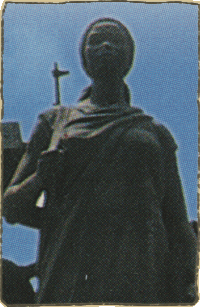“The fight continues…”

Dear Deolinda,
Continuing to read through your diary, I’m sometimes frustrated at having to look up so many words in my Portuguese to English dictionary, after all these years of not speaking the language that you and I once spoke together…when you were not practicing your English on me!
 I’m also aware of how you integrated a lot of Kimbundu words and phrases into the thoughts you recorded in your diary. Many of them are a reflection of your determination to move away from the long history of colonialism in your country and the Portuguese language that was the “official” language of the country during your years of growing up and schooling in the Portuguese system.
I’m also aware of how you integrated a lot of Kimbundu words and phrases into the thoughts you recorded in your diary. Many of them are a reflection of your determination to move away from the long history of colonialism in your country and the Portuguese language that was the “official” language of the country during your years of growing up and schooling in the Portuguese system.
You spend quite a lot of time debating such things as the role of women in society once your people have achieved independence and peace comes to the land. You also talk about mesticos, or half-breeds, and the position they should have in the new society, although you admitted that the color of one’s skin should not be the determining factor for a person’s acceptance as a full member of the community.
You rail a bit about the hell that white colonialists delivered to your country. And yet, you said, you really only wanted your dignity as human beings. In upper case letters, you proclaimed: WE HAVE TO CHANGE THIS SITUATION. The fight must go on, you wrote.
And fight you did.
In 1965, in written pleas recorded on your diary pages, you begged for your mother’s patience, calm, optimism and dedication as you faced the future. At the same time, you moaned that your own people had been too patient, that they had been too accepting of the merciless deeds that had been perpetrated upon them at the hands of the oppressors.
In 1967, your words turned into action, as you joined a group of 127 MPLA guerrillas and volunteers delivering weapons, ammunition and medical supplies to warriors embattled near the Congolese border. This was toward the beginning of the long years of civil war that continued after independence from Portugal had been attained.
You wrote from the jungle, walking for hours upon end, day after day. You crossed a river, and crossed it again. Your feet became one solid blister, and you and your companions applied all the home remedies you had at hand so you could continue to walk.
You were soaked and soaked again from downpours that never stop during the African rainy season. You spotted the plane that appeared overhead periodically, apparently to deliver more supplies, and perhaps food for you and the other fighters. You were constantly alert to being spotted by enemy soldiers, and you wore the same camouflage clothing, day after day, that you donned at the beginning of your journey.
Food became a top priority, as repeatedly you wrote about being hungry. Your group searched for coconuts and edible leaves; sometimes in your hunger you ate fruit that was overripe. Then you suffered from dysentery and diarrhea.
You slept on the ground, never risking being too near the road because you might be discovered. You sometimes had a mosquito net to protect you, but not often. Once you wrote about taking your last dose of quinine as a deterrent to getting malaria.
Hunger was a constant theme, as you and everyone else suffered all sorts of maladies, from your swollen face to your aching feet. And the rains continued to fall.
At some point, you buried the arms and ammo you had been carrying, and wondered how you would defend yourselves if you were attacked. But you were exhausted from lack of food, lack of sleep, from the humidity that was part of the ongoing rainfall, and from the weight of all the supplies you hoped to deliver to your compatriots, once you reached them.
Again, in your anguish you implored the spirit of your mother, as you advanced toward almost certain peril, after so much sacrifice.
…And then came the ultimate sacrifice.
Your diary’s end leads us to the grim conclusion: your capture. And later reports came that you had been tortured and killed.
How you continued to leave such a written record is a remarkable gift to those who knew and loved you and believed in the cause for which you gave your life. The person who typed the whole diary in preparation for its publication by Roberto noted that some words were left blank because they were unreadable and couldn’t be transcribed properly.
But, oh my, the spirit of the words is there, and so is the message of your dedication and hope, dear Deolinda.
